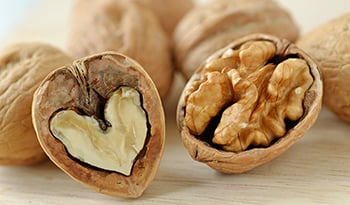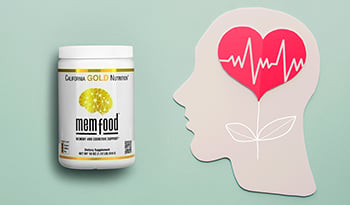4 Easy Ways to Protect Your Brain Power—Now That’s Smart!
DISCLAIMER:This blog does not intend to provide diagnosis...
- In this article:
- 1. Healthy Nutrition and Your Brain
- 2. Physical Activity and Cognition
- 3. Resting and Restoring Your Brain
- 4. De-Stressing from Distress

When you think about improving your health, chances are you focus on weight management, heart health, muscle tone and strength, and skin quality. But many of the same choices you make to improve and protect the overall health of your body may help to support your brain health.
Four important brain boosters you can adopt are:
- Healthy nutrition
- Consistent physical activity
- Restful sleep
- Effective stress management
Let’s see what they can do for your cognition.
1. Healthy Nutrition and Your Brain
Making sure you eliminate high-fat and over-processed foods from your diet is a great first step to tamping down inflammation in your body and brain. You may also consider brain-fueling and cognition–protective nutrients and spices such as zinc, vitamin B12, and turmeric.[1]
Zinc
A 2022 study says[2] that a zinc deficiency can impact sleep and cognition. Your best defense against a zinc deficiency is to add foods to your diet that provide a good dose of the mineral:[3] oysters, fortified breakfast cereal, baked beans, and dark meat chicken, as well as almonds, pumpkin seeds, and chickpeas.
B12
According to the National Institutes of Health Office of Dietary Supplements, approximately 6% of adults younger than 60 have a vitamin B12 deficiency, and close to 20% of those older than 60 are deficient. B12 helps optimize sleep and memory and helps to maintain the brain’s nerve function. Foods that contain B12 include poultry, eggs, and fortified breakfast cereals[4]. Supplementation is often recommended, especially as you get older.
Turmeric
This spice, whose active ingredient is curcumin, is anti-inflammatory and, according to a 2019 study[5], might help by stopping the formation of amyloid tangles in the brain that can impede cognition.[6]
2. Physical Activity and Cognition
According to the Centers for Disease Control and Prevention (CDC)[7], consistently engaging in physical activity can reduce your risk of cognitive decline. A study in Preventive Medicine[8] found that over the course of a year, an increase in cognitive decline affected almost 16% of people 45 and older who didn’t get at least 30 minutes of physical activity most days. In contrast, cognitive decline affected just under 9% of those who met the CDC’s recommendation of 150 minutes of moderate-intensity physical activity and two days of muscle-strengthening activity weekly.[9]
3. Resting and Restoring Your Brain
It’s estimated that 30% of adults around the globe contend with symptoms of insomnia,[10] including trouble falling asleep, staying asleep, or sleeping deeply.
If you have sleep issues, consult a sleep specialist. Bonus: The Sleep Foundation[13] suggests that melatonin and lavender may help people achieve more restful and deeper sleep.
4. De-Stressing from Distress
Research shows that chronic stress is associated with cognition problems. One analysis showed living with elevated levels of stress was associated with higher odds of poor cognition compared to being free of chronic stress.[14]
Stress management can include meditation, physical activity, a healthy sleep regimen, and nutritional choices that encourage quality sleep. To manage stress, the Cleveland Clinic recommends[16] an anti-inflammatory diet that includes fatty fish, poultry, fruits, vegetables, 100% whole grains, and healthy fats such as olive oil. Some supplements may help you improve sleep quality[17], such as melatonin (3 mg), 5-HTP (30 mg), L-theanine (200 mg), and valerian,
References:
- https://www.iherb.com/blog/nutrition-and-brain-health/688
- https://www.ncbi.nlm.nih.gov/pmc/articles/PMC9312494/
- https://www.medicalnewstoday.com/articles/325916
- https://ods.od.nih.gov/factsheets/VitaminB12-HealthProfessional/
- journals.lww.com/nrronline/toc/2018/13010
- Beta-Amyloid Deposition and the Aging Brain - PMC (nih.gov)
- https://www.cdc.gov/nccdphp/dnpao/features/physical-activity-brain-health/index.html
- https://www.sciencedirect.com/science/article/abs/pii/S0091743520303030?via%3Dihub
- https://www.cdc.gov/physicalactivity/basics/adults/index.htm
- https://my.clevelandclinic.org/health/diseases/12119-insomnia
- https://my.clevelandclinic.org/health/diseases/12119-insomnia
- https://www.ajpmonline.org/article/S0749-3797(23)00009-0/fulltext
- https://www.sleepfoundation.org/sleep-aids/natural-sleep-aids
- https://jamanetwork.com/journals/jamanetworkopen/fullarticle/2802090
- https://www.ncbi.nlm.nih.gov/pmc/articles/PMC5991350/
- https://health.clevelandclinic.org/eat-these-foods-to-reduce-stress-and-anxiety
- Sleeping Aids| iHerb Blog

 By Dr. Mehmet Oz, M.D.
By Dr. Mehmet Oz, M.D. 


